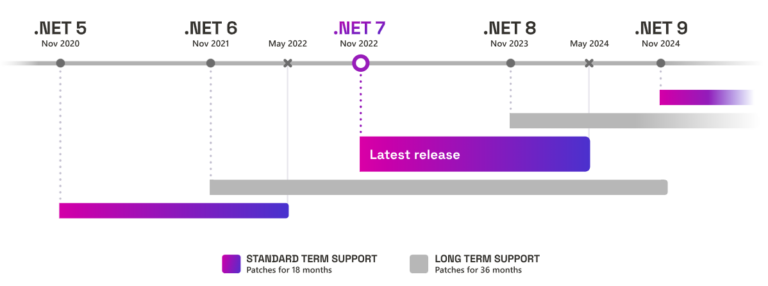
Hey there, tech enthusiasts! Let’s dive into the captivating realm of .NET Framework, .NET Core, .NET, and the intriguing world of versioning. Buckle up as we untangle the web of confusion surrounding these technologies!
What’s .NET?
- .NET Framework: This is where it all began, a comprehensive and mature framework for building Windows applications. It has been around for years, offering developers a vast library of APIs and tools.
- .NET Core: Enter .NET Core, a cross-platform and open-source framework that marked a significant shift in the .NET ecosystem. It’s leaner, faster, and designed to support various platforms, including Windows, Linux, and macOS.
The Transition: .NET Framework to .NET Core
- Why the Shift?: .NET Core addressed some limitations of the traditional .NET Framework, such as platform dependency and performance issues. Plus, going open-source was a game-changer, fostering community collaboration and innovation.
- Migration Challenges: Moving from .NET Framework to .NET Core wasn’t always straightforward. Compatibility issues, dependency concerns, and differences in APIs posed hurdles for developers.
Enter .NET 5 and Beyond.
- Unification Efforts: Microsoft’s vision to unify the .NET ecosystem led to the birth of .NET 5, the successor to both .NET Core and .NET Framework. It aimed to streamline development and offer a single unified platform.
- Introducing .NET 6 and 7: With each iteration, the .NET journey evolves. .NET 6 continued the unification journey, while .NET 7 promised exciting features and enhancements, keeping developers busy.
Understanding Versioning Confusion
Microsoft has a knack for keeping us on our toes with their naming conventions!
From Windows versions like Windows 95, and Windows 2000 to the recent leap from Windows XP to Windows 11, it’s been a rollercoaster ride of numbers and surprises.
And let’s not forget the Xbox saga – Xbox 360, then Xbox One, followed by Xbox Series X and S. Talk about keeping gamers guessing! So, here’s a shoutout to Microsoft for keeping us entertained with their naming shenanigans.
The naming conventions of .NET versions have evolved over time, leading to some confusion. From .NET Core to .NET 5, .NET 6, and beyond, keeping track of the latest releases can be challenging.
From a bird’s-eye view, here’s the scoop: .NET Framework strutted onto the scene first, strutting its stuff all the way up to version 4.x. Then, along came .NET Core, bopping along with versions up to 3.x. But guess what? They both decided to ditch their last names—Framework and Core—and live happily ever after as simply .NET.

Which Version to Choose for Your Next .NET Project?
When deciding on the .NET version for your project, understand what is LTS or long-term support:
- Hobby Projects: Go for the latest for the thrill and newest features.
- Fintech or Critical Apps: Opt for the latest LTS version for stability and long-term support.
Latest LTS: .NET 8x
- Benefits: Enhanced performance, cloud integration, and reduced memory footprint.
- Support: Enjoy official support of .net8x until November 2026, ensuring stability and security updates.

What about the support for .NET Framework 4x
From version 4.5.2 onwards, .NET Framework became bundled with the Windows operating system as a component. This means it follows the same update and support schedule as the version of Windows you’re using.
Conclusion: Embracing Evolution
In the ever-evolving landscape of software development, adaptation is key. While the .NET journey may have its twists and turns, it’s ultimately a testament to innovation and progress. So, embrace the evolution, stay curious, and keep coding!
And remember, when in doubt, just “.NET” it out!
About the Author:
With more than 15 years in R&D, Rathish is constant at the helm of our operations for the past five years. He has over twenty years of experience building applications in multiple domains. They include virtual STEM labs, medical simulations, computerised adaptive assessments, mobile applications for adult literacy and health care, Interactive eLearning modules, creative animations, retirement planning and fintech solutions. He has a hands-on approach to user needs and changing market situations while still bootstrapping and ensuring customer satisfaction. He manages the financial portfolio at Founding Minds Software.

